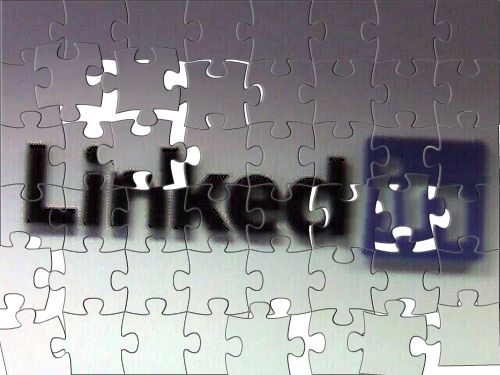Sign up and fuggedaboutit
Not sure if it was at REBarCamp or at Inman Connect a couple of weeks ago…but the discussion was about social networks and how they each have their own personality and should be used differently. Someone suggested that LinkedIn is an easy one to participate in because you don’t have to participate. You put your resume-type stuff in and forget it. You should check in once in awhile to approve connections but there isn’t much more to it. It struck me at the time as odd because everything else I heard that week screamed ‘ENGAGE!’ but that, apparently, is not a requirement for using LinkedIn. You’re just supposed to be there. If this is true, then what exactly is the point of ‘being there’? Just in case someone does a search for services in your area? I don’t get it.
Then today I happened to read an article someone sent to me awhile back that says LinkedIn users have higher incomes. This article describes the demographic of the users and the correlation between income, number of connections and job responsibilities that often include purchasing, decision-making and senior levels within companies. Hmmm. Now you have my attention! Let’s work with that.
The nuts & bolts of creating your profile…and?
Guy Kawasaki lists some ways to use LinkedIn for business and this site lists 100 ways to use LinkedIn. And this Active Rain post discusses how to actively use LinkedIn as a REALTOR(R). These articles are all great how-to articles on how to enhance your profile and use some of the features like Q & A and Recommendations, and I guess these are great starting points. But this does not make me love LinkedIn nor does it show me what to do, or why. It’s just not clicking for me. Perhaps we need to think about who we are talking to and what they need from us.
Capitalizing on how LinkedIn is different
I keep going back to the demographic of LinkedIn and wonder if there is more opportunity here than my untrained eye can see. Instead of participating in whatever features the site offers as just ‘a real estate agent’, shouldn’t we be offering something more specific? Does the fact that you have all of these movers and shakers in one place, Fortune 500 companies, consultant-types with huge networks of connections, for example, change how you present yourself and the things you do on the site? Certainly there is a different strategy and attitude expectation than on, say, Facebook with it’s poking and sheep throwing.
Who would not like to be the go-to real estate agent for a company’s human resources or relocation departments? I imagine acquiring large accounts like this would require you to change the way you present yourself online and on LinkedIn specifically. Illustrate your ability to handle relocating employees and how you can make these kinds of transactions smoother and easier for the relocating employee and the company. Elaborate on the support you have through your company’s offerings or via personal assistants. Talk about your activities related to relo’s via your status updates. How about a digital relocation package? Link to that.
What about foreclosure/REO accounts? Are there opportunities to get in front of decision makers at owner-banks and servicing companies? How can you target these contacts and communicate your value proposition to them?
I have not figured all this out yet, so I’d love to hear how you’ve been using this network.
What is your game plan?
Just like in our blogging efforts and our participation in other networks, I’m pretty sure we need to be thinking about our audience on LinkedIn, what they need, what kind of things they respond to and how we can engage them. But it hasn’t gelled for me.
Be a Genius and share your strategies on LinkedIn in the comments! Please? 🙂
Lisa sells residential real estate in the Pocono Mountains of Northeastern PA, and authors The Poconos Real Estate Blog. Being a strong believer in community participation, she currently serves as President of a 1700 home Property Owners' Association and Secretary of the Board of the local REALTOR Association for 2009. Her most challenging and fulfilling role, though, is that of Mom to two teenage girls, and her main hope for them is that they learn to appreciate the abundant joys of a life lived with a positive attitude. You can connect with Lisa on Twitter, Facebook and/or LinkedIn.








































Brandie Young
January 20, 2009 at 9:02 pm
Lisa – GREAT post!
As LinkedIn has evolved there are so many great features, but since they don’t seem to announce them, or have an easy-to-find tutorial it’s easy to miss them. (there’s that stealth marketing) It’s hard to shift to LinkedIn if you Twitter b/c you don’t get the immediate gratification of a back and forth conversation.
That being said, coming from the corporate world I LOVE LinkedIn. I can easily connect with subject matter experts in a variety of areas – and typically they are just one degree away. I’ve recruited from LinkedIn and found web development and graphic design vendors.
You hit it on the head – it is a more “professional” venue (no sheep throwing) so in many cases one may want to be a bit more mindful of presentation. But that doesn’t mean you need to lose your personality.
As a test, ask a question to see the response. A real question, not one that’s a bait to get customers. I believe there is the need for the same authenticity and relationship building as places like Twitter, so it may not be the best idea to go in pitching!
Brandie
Brandie Young
January 20, 2009 at 9:04 pm
p.s. Real Estate Connect has an active group on LinkedIn. There are currently about 500 discussions going on in that group!
Elaine Reese
January 21, 2009 at 8:22 am
I treat LinkedIN much differently than Realtor-type sites. Connecting with other agents is not my priority there. I set up a group for my former corporate company, and use it to stay in touch. IMO, it’s not a place to blast self-promo ads all over the place. It’s far more professional than that. Afterall, if we’re connected with clients (and thus, their peers/bosses), we don’t want to embarrass them.
Brian Brady
January 21, 2009 at 9:16 am
Best LinkedIn Practices can be learned here. As a 5 year member of LinkedIn and a serial user, this is one of the best FREE training calls you’ll hear:
https://www.hardtofindseminars.com/Linkedin_Training.htm
Nicole Boynton
January 21, 2009 at 11:50 am
Hi Lisa –
I update my status on LinkedIn but haven’t done much more than that. It does come in handy if you need to find other people for speaking events but I haven’t yet had a client find me from there. I will check out some of the posts you mentioned. Thanks for the information.
Laura Olesen
January 21, 2009 at 6:47 pm
Thanks, Lisa, for the article and, everyone for the comments. I have been guilty of posting and more or less ignoring LinkedIn. I love knowing where people are and being able to find them but have missed many of the features. I look forward to checking it out anew.
PS Does anyone see any value to Plaxo?
Missy Caulk
January 22, 2009 at 6:51 am
Lisa, LinkedIn is changing to keep up with how all the other social networks work.
It was first and then IMO lost relevance except to have a profile there.
Now we can bring our posts in etc…
Laura, I love Plaxo too, keeps all my contacts updated automatically.
Lisa Sanderson
January 22, 2009 at 11:06 am
Brandie: Thanks for your input. I guess I need to go and spend some time there. Honestly, I have not done that.
Elaine: Act like you’re wearing a suit on LinkedIn…got it! 🙂
Brian: Thanks for the resource!
Lisa Sanderson
January 22, 2009 at 11:10 am
Nicole: Please come back and share any insights you gain…I’m looking for help!
Laura: Never used Plaxo. I will check it out.
Missy: Yes, I’ve noticed some changes and added a couple apps. I think I need to participate in some groups to mix it up a little.
Paula Henry
January 22, 2009 at 5:04 pm
A few months ago, I started searching for ways to join local groups and was surprised to find so many. The local Chamber has a group, as do many businesses, so I joined. I haven’t been refused an invtation yet. I also found the groups to be quite active.
Eric- New Orleans Condos and Lofts
January 22, 2009 at 8:10 pm
I think they are changing as well to become a more active and more interactive network. I do not go there as often but tend to see the same realtors in all these places.
Faina Sechzer, Princeton NJ
January 24, 2009 at 6:16 am
Lisa, you are raising a very good question about what LinkedIn is or could be for real estate professionals. I have been pondering the same. The original intent was to help people find jobs through networking. Not in the way of “chit chat” on Twitter or FB, but more of finding and connecting with people that could help one find a job opportunity. To me this means somehow connecting with them personally. The same could apply to a real estate agents. Could we helps others find connections in the corporate world? This is different then trying to pitch our services. My plan is to start a local networking LinkedIn group for Princeton with the same objective – networking for jobs. My 2c.
David Markley
January 25, 2009 at 10:50 am
Lisa, while I’m not in your line of business (I’m a Financial Advisor), I have been using LinkedIn heavily for the past six months or so and it has increased my business tremendously. I use it to get introductions to the people I can help the most. I use LinkedIn fairly aggressively in that whenever I have a meeting with someone, I always ask if they are on LinkedIn and get connected with them before I meet. I always ask for introductions and usually get introduce to between three and ten people. I’m not saying you would necessarily use it the same way, but if you put the time into and develop a strategy, I’m confident it will pay dividends! Hope this helps!
Claudia Jordan
May 6, 2009 at 12:46 pm
Thanks for the post. I’m fairly new to social networking and have a new blog. For LinkedIN, I was invited by a friend and only filled out the bare minumum info and ignored it. Then I saw that LinkedIN was referring a good number of people to my webiste / blog. I have gone back to LinkedIN and beefed up my profile and discovered I could link to my blog. Very cool! One question: when other people want to link to me and I don’t know them, should I say yes or no?
Lani Rosales
May 6, 2009 at 12:51 pm
Claudia, each individual is different, but my personal practice is to remain much more guarded with Linked-In as it is my professional face and my online resume. I allow almost anyone on Twitter and to a degree on Facebook, but Linked-In stays with me forever and the risk outweighs the reward with collecting “connections” just to appear “connected.”
If you know them online or have spoken on the phone and trust the association does you good, then have at it, but if it’s a stranger, I don’t support collecting connections in that professional environment. Hope this helps! 🙂
Kevin Sandridge
May 27, 2009 at 11:58 am
Have to echo Missy’s take. LinkedIn seemed a bit limited initially. They have done a great job integrating other social media/blogging streams since then.